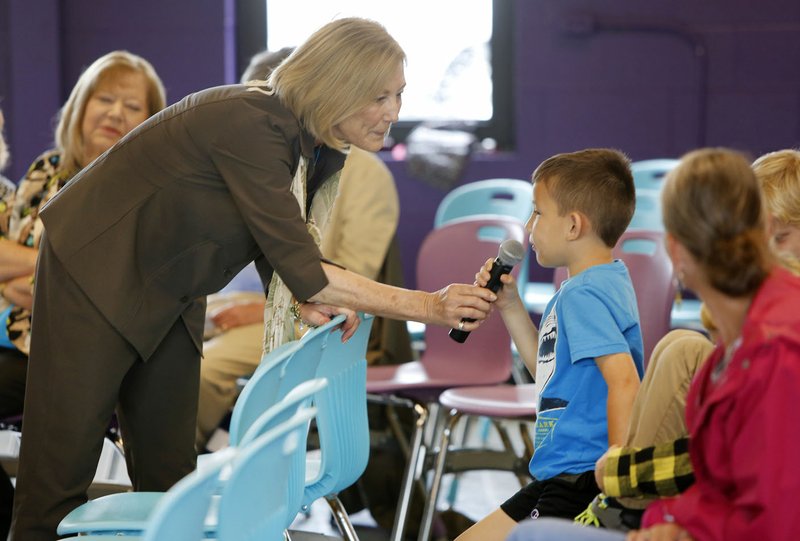FAYETTEVILLE -- Julianna Roosevelt remembers her great-grandmother Eleanor Roosevelt as a woman who left cookies by her bed when she visited and read aloud stories by Rudyard Kipling and Shakespeare.
"I didn't think of her as the First Lady of the world," Julianna Roosevelt, 64, told a student from Washington Elementary School on Friday.
Celebrating Diversity in Education Banquet
• When: 7-9 tonight
• Where: Fayetteville Country Club, 3335 S. Country Club Drive
• Tickets: $50 at eventbrite.com
• Guest speaker: Julianna Roosevelt, great-granddaughter of Franklin D. and Eleanor Roosevelt
Source: Northwest Arkansas Democratic Black Caucus
Roosevelt is in town for the annual Celebrating Diversity in Education Banquet, organized by the Northwest Arkansas Black Caucus. The event begins at 7 tonight at the Fayetteville Country Club.
Roosevelt, now a landscape designer in Long Beach, Calif., took time Friday to speak to students at the Agee Lierly Life Preparation Services Center, an alternative school of innovation for Fayetteville High School students. Children from other schools attended, including Washington Elementary School and Fayetteville Christian School.
Julianna Roosevelt's father, Curtis Roosevelt, was a grandson of Franklin and Eleanor Roosevelt. Curtis Roosevelt's mother was Anna Roosevelt. The former president died before Julianna Roosevelt was born, but Eleanor Roosevelt lived until 1962 when Julianna Roosevelt was about 11.
Roosevelt told students she was shy like Eleanor Roosevelt and felt embarrassed to have such a famous last name. As an adult, though, her perspective changed, she said, adding her famous last name means "human rights."
Eleanor Roosevelt thought human rights efforts begin in the small places where people live, work, go to school and raise families, Julianna Roosevelt said.
Roosevelt told of a time her great-grandfather was sitting in his study preparing for a speech to Congress. He was interested in four freedoms everyone should have: the freedom to worship as they please, to speak about their beliefs, to have their basic needs for survival met and freedom from fear and worry.
Those four freedoms in 1948 later were incorporated into the Universal Declaration of Human Rights, a document adopted by the United Nations General Assembly to protect everyone's rights, Roosevelt said.
"You have a right to go to school," she told the students. "You have a right to play."
The list of rights for children include enjoying their childhood, having a place to live and to be parented, with some families having two men, two women or grandparents, she said.
Roosevelt asked the students what they would like to have as a right. Responses included the right to a job that pays enough money to support their families and not having to worry about paying for college.
Alexander Margulis, a 10-year-old Washington fourth-grader, said he'll remember hearing Roosevelt for the rest of his life.
"It's really special to me," he said because Franklin D. Roosevelt is his favorite president.
Franklin Roosevelt was an important influence in the family of Michelle Hayward, principal of McNair Middle School, she said in her introduction of Julianna Roosevelt. Hayward's grandmother Mildred Owens, 90, was the third of eight children in a family from Flippin.
The family was starving, Hayward said. Owens' father would go from neighbor to neighbor asking for food.
After Franklin Roosevelt became president, Owens' family reaped the benefits of many of his programs, she said. When Owens was about 10 in the mid-1930s, her grandfather took a covered wagon to Summit and came home with dried apples, canned beef, flour and a jar of peanut butter, she said.
"That is when they knew they were going to be OK," Hayward said. The family has kept the clear glass jar that held the peanut butter, a jar Owens handed down to Hayward.
Owens now lives in Havana and attended the event at the Agee Lierly school. She remembers how her community changed with jobs created through the Civilian Conservation Corps and the Works Progress Administration, she said.
"Everything changed for the better," she said.
NW News on 04/30/2016
